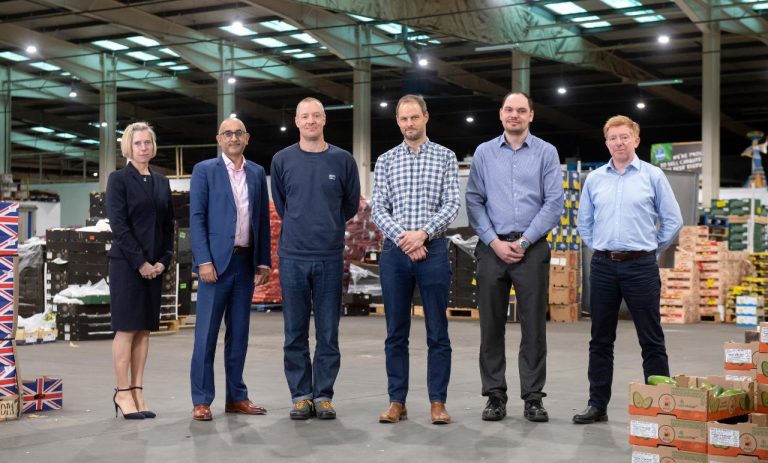Sheffield food firm takeover saves 25 jobs
Twenty-five jobs have been saved at Sheffield-based Delicious Alchemy after the Kris Wigfield, Jo Hammond and Andrew Mackenzie of Begbies Traynor were appointed as joint administrators.
Founded in 2006, the Sheffield-based business produced both branded and own label allergen-free breakfast cereals and baking mixes for the major supermarkets.
Having expanded Delicious Alchemy with customer demand leading to the opening of a dedicated factory, unfortunately, the director was forced to take two years out of the business due to illness. During that time, the company lost market share in its brand and became more dependent on own label. After losing a key own label contract, its revenue fell and this was exacerbated by the impact of the pandemic with rising costs of ingredients and packaging, social distancing measures and distribution challenges.
The business was unable to meet it ongoing liabilities and sought insolvency advice from Begbies Traynor, working with specialist asset advisers, Eddisons, also part of Begbies Traynor Group.
After a period of marketing the business via Eddisons, a pre-packaged sale to Clent Management Limited (CML) was completed, allowing the business to continue trading with all 25 jobs have been transferred to the buyer.
Kris Wigfield, partner at Begbies Traynor, said: “This was a satisfying job to work on as it saw a Sheffield business being saved, together with numerous staff retaining their jobs. It was unusual in that so many professionals across the city were involved and is a great example of the depth of expertise that we have in this region.”
The company was advised by Oliver Jackson at Freeths and the Administrators were advised by Tom Paton and his team at Irwin Mitchell. The director was advised by Neil Kelly at MD Law
Business Lincolnshire launches Creative Catalyst workshops for local businesses
The new workshops will commence next month, allowing Lincolnshire and Rutland businesses the opportunity to develop their creative potential.
Starting on Wednesday 13th July, the three-session workshops from Business Lincolnshire will be hosted by Rebecca Stockdale, innovation and start-up consultant at Much Clearer, who will advise and train businesses on creative approaches to innovation.
The workshops will allow local businesses to identify new opportunities for exploration, gain a deeper understanding of how they can refine their current products and services, whilst learning how to diversify with new offerings for customers.
Businesses will be able to access the sessions online, including an interactive introduction to creative thinking, as well as a two-hour 1-to-1 session focused on their specific business needs. The course is designed for organisations with five or more employees, with two participants attending the workshop sessions and an expanded team in the final session.
Samantha Harrison, head of the Business Lincolnshire Growth Hub at Lincolnshire County Council, said: “We’re really excited to be able to offer this fantastic opportunity for local businesses looking to develop their creative potential. Rebecca is so passionate about helping businesses grow, and her experience using creative techniques to help solve some of the key challenges businesses face is second to none.
“It’s great to partner with the team at Much Clearer and deliver these workshops for businesses across Lincolnshire and Rutland; we hope the sessions will inspire businesses looking to innovate and evolve with new offerings, products or services and help them engage with their customers.”
The first session in the Creative Catalyst series launches on Wednesday 13th July, with session two taking place the following week; the final workshop can be booked around individual businesses’ availabilities.
The sessions are free of charge to businesses registered with Business Lincolnshire. More information about the event can be found online here.
Leeds-based print and direct mail specialist snapped up
Paragon Customer Communications (Paragon) has acquired Leeds-based print and direct mail specialist, The Lettershop Group (TLG).
In this strategic acquisition, TLG and its 142 UK-based employees will become part of Paragon Customer Communications UK, Ireland and Luxembourg.
This deal forms part of Paragon’s ongoing growth plan, which will augment the company’s strong organic growth performance and their capabilities, talent and market share with strategic acquisitions. TLG’s Leeds site and expertise, steeped in its 136-year heritage, will enhance Paragon’s current offerings.
The acquisition of TLG will extend Paragon’s direct mail and packaging portfolios and broaden the range of solutions it can offer clients. Paragon believes TLG offers great potential for future growth due to its strong client base and dedicated staff.
John Rogers, executive director, corporate development, Paragon Group, said: “Paragon is committed to its acquisition-led growth strategy. Incorporating TLG will provide us with the opportunity to continue our growth trajectory and offer increasingly innovative solutions to our customers in a market that remains fragmented.”
Jeremy Walters, CEO of Paragon Customer Communications UK, Ireland and Luxembourg, said: “We are delighted to welcome TLG and our new colleagues to Paragon. Its industry knowledge, expertise and dedication to its customers will help to strengthen our position within an evolving market, and we are thrilled to begin working with its 142 committed staff members.”
£30m station plans on the right track
Plans are on track to improve Halifax Rail Station and the surrounding area, with feedback from a recent consultation being used to shape the project.
Calderdale Council, in partnership with Network Rail, is developing plans to transform the station building and improve access and its facilities.
The £30million-plus project, which is being funded by the West Yorkshire Combined Authority, includes plans for a new two-storey station building, with comfortable waiting lounges on both the ground and first floor level, improved toilet facilities and opportunities for additional retail options.
Access to the station will also be improved with a modern pedestrian bridge providing step-free access to and from the town centre. An historic underpass beneath the station would also be reopened to improve access to the eastern side of the rail station.
Further proposals include convenient drop-off facilities, car parking with electric vehicle (EV) charging points and taxi pick-up areas and improved walking and cycling facilities, including upgraded bike storage.
To help inform and develop detailed proposals for the project, a public consultation took place from November 2021 to January 2022. The scheme’s proposals were available to view on the Combined Authority’s Your Voice web page, along with feedback surveys. Paper copies were also available from outlets within Halifax town centre.
480 responses were received, with over 77% stating that they were either happy or very happy with the proposed improvements. Over 66% of respondents also said that the improvements would encourage them to use the rail station more often.
As part of the consultation, meetings were also held with local interest groups, where feedback to the proposals was also positive.
All the feedback received in the consultation is being used to refine designs for the project ahead of the planning application being submitted later this year. Further opportunities will be available for people to have their say on these detailed proposals, prior to construction.
Calderdale Council’s cabinet member for regeneration and strategy, Cllr Jane Scullion, said: “As the gateway to the town, it’s important that Halifax Rail Station is a welcoming, accessible and fit-for-purpose facility. The proposals to improve the station and surrounding area will make a real difference and complement extensive investment around Halifax town centre.
“The positive feedback on the latest proposals from the recent consultation exercise has helped reassure us that the plans are on the right track. The comments received will be really useful in helping us develop detailed designs, ensuring that the improvements meet the needs of those using the station.
“It was particularly reassuring to see that so many respondents said that the improvements would encourage them to use the station more. Something that fits with our work to encourage sustainable travel, reducing carbon emissions and helping to tackle the climate emergency.”
Tracy Brabin, Mayor of West Yorkshire, said: “I want to grow our economy, connect more people with opportunities and tackle the climate emergency on our way to becoming a net zero carbon economy by 2038.
“We need a reliable and efficient transport system to do this and transforming Halifax Rail Station is a great example of how we are working in partnership to make West Yorkshire an even better place to live, work and flourish.”
Cllr Susan Hinchcliffe, chair of the West Yorkshire Combined Authority’s Transport Committee and leader of Bradford Council, said: “We are pleased to be working in partnership with Calderdale Council on this scheme. It’s going to make it easier for people to move around our region and I would like to thank everyone who made the most of this opportunity to help shape the plans by taking part in the public consultation.”
The scheme has received more than £30million from the Leeds City Region Transforming Cities Fund (TCF) and West Yorkshire Plus Transport Fund (WY+TF) programmes.
Business rate relief scheme set to play valuable role in Leeds life
Senior councillors will this week be asked to approve plans for an initiative providing extra financial support to businesses making a positive difference to life in Leeds.
Proposals for Leeds City Council’s new discretionary business rate relief scheme will go before the authority’s executive board at a meeting on Wednesday (June 22).
If it gets the green light, the scheme will launch later this year, with successful applicants receiving up to £15,000 off their annual business rates bill.
Support would be targeted at social enterprises, businesses that are in their first three years of trading and businesses which have a social or civic purpose that delivers wider benefits to local people and communities.
Reduced expenditure on rates will, it is hoped, give recipients more scope for investing in innovation, research and development while, crucially, helping them retain and create the kind of high-quality employment opportunities that underpin the council’s ambitions for inclusive growth.
Businesses chosen for assistance would be expected to sign a corporate and social responsibility pledge that would see them committing to actions such as hosting community-based activities or improving the skills and employability of young people in education.
The new scheme would have a capped budget of £1.75m per annum, with 50 per cent of its costs being met by central government. Priority would be given to applications from businesses occupying premises that have a rateable value between £15,000 and £51,000.
Providing rate relief is seen as a cost-effective way of helping firms maintain or scale up their presence in Leeds, with their continued and potentially increased contribution to the local business rates base also generating useful future income for the council.
Previous council-operated discretionary rate relief schemes were put on hold in 2020 following the introduction of other forms of support specifically designed to help businesses cope with the impact of the COVID-19 pandemic and its associated lockdown restrictions.
The council has the option of simply reopening its previous discretionary schemes now that COVID-19 restrictions have been lifted, but the new plans – with their added focus on social value – are regarded as a better way of meeting the changed economic needs of the business community and the city as a whole in the post-pandemic era.
Councillor Jonathan Pryor, Leeds City Council’s executive member for economy, culture and education, said: “We want to do everything we can to support our local businesses, particularly after the difficulties many of them experienced as a result of the pandemic.
“This scheme will help us deliver good value for the taxpayer by getting that support to businesses, innovators and entrepreneurs whose products and services have a positive impact on people’s lives.
“Its focus on social value also aligns well with our inclusive growth strategy, which aims to ensure that everyone has the opportunity to benefit from the strength and vibrancy of the Leeds economy.
“We believe the scheme will not only help businesses create and retain jobs but also see them providing improved jobs, giving people across Leeds the best possible chance to make the most of their skills and potential.”
Subject to executive board approval this week, applications to the new scheme will open in September.
New university partnership set up to support growth of Wakefield greetings card company
Marketing and engineering experts at Leeds Beckett University have teamed up with Wakefield-based Riverside Greetings Ltd to bring academic knowledge, experience, and insight into the business – setting them up for long-term growth and sustainability.
A team of academics will work with Riverside Greetings Ltd – designers and suppliers of greetings cards based in Ossett, Wakefield – on the two-year Management Knowledge Transfer Partnership (mKTP), which is part-funded by the Government through Innovate UK.
Dr Nick Halafihi, Head of Subject for Marketing, Public Relations and Journalism at Leeds Beckett, is co-leading the partnership. He explained: “Riverside Greetings design and supply cards to convenience shops including Spar, Nisa and Costcutter. They are an ambitious company who want to embrace new innovations in technology.”
Co-leader, Dr Esther Pugh, Senior Lecturer in Business Strategy and Marketing, added: “Our mKTP will bring together experts from across the university – our focus will be on strategic marketing, productivity, and developing cutting-edge new technology for managing and analysing data within the company.”
A skilled graduate will be recruited to carry out the project, as a full-time member of staff within the business, and with the full support and input of the academic team at Leeds Beckett. The academics all have extensive experience of working with small and medium-sized enterprises (SMEs) on knowledge exchange projects.
Andrew Glen, Managing Director of Riverside Greetings, said: “We are delighted to be working with Leeds Beckett on an mKTP which will transform the greeting card category in the growing convenience sector, whilst creating a step change in the growth of our business and additional jobs. Our mission is to help convenience retailers sell more greetings cards and they will benefit from performance improvements – and their shoppers will benefit from a proposition which is better tailored to their needs.
“There is a strong and developing relationship between Riverside and Leeds Beckett which started with my participation in the Small Business Leadership Programme, has included the involvement of members of our management team in the Women Empowered through Coaching and Networking (#WECAN) programme – and is now moving into this exciting Management Knowledge Transfer Partnership.”
Manufacturers call for pre-recess support package amid worsening economic outlook
Britain’s manufacturers are calling for an emergency, pre-recess package of business support measures to help shield companies from a potent cocktail of escalating costs amid a worsening economic outlook.
The call comes on the back of the Make UK/BDO Q2 Manufacturing Outlook survey which shows growth and orders slowing significantly, exports almost at a standstill and, investment nosediving as companies cut or postpone their plans in order to maintain cashflow.
According to Make UK, the seriousness of the situation and, the prospects for the next six months, means that industry cannot wait for the promised help in the Autumn which the Chancellor made in the Spring Statement, with action required urgently before the summer recess. In response, Make UK has made a number of recommendations for measures Government can introduce now to address rising business costs including the following:
- Waive or reduce business rates for the next 12 months
- Implement VAT deferrals for larger businesses and waive completely for SMEs
- Temporarily freeze the Climate Change Levy and, if energy costs continue to rise, remove it completely
- Review the efficacy of the business interruption loan schemes introduced during the pandemic and deploy a successor scheme by Q3
- Extend the super-deduction investment policy
- Make the increase in the Annual Investment Allowance permanent
Unity appointment committed to tenant wellbeing
Temo Elbakidze has joined Unity Homes and Enterprise as Housing Services Manager.
He will have lead responsibility for delivering an outstanding customer experience for tenants living in more than 1,300 properties owned and managed by the BME housing association in Leeds and Kirklees.
Mr Elbakidze, who will report to Interim Director of Operations David Higgins, was previously Area Operations Manager at Horizon Care and Education, having held senior management roles at Leeds Housing Concern and Great Places Housing Group.
A Leeds Beckett University housing graduate, he also has a degree in mechanical engineering from Georgian Technical University in Tbilisi and is a member of the Chartered Institute of Housing.
Temo Elbakidze said: “I am excited to be at Unity which is strongly committed to supporting BME communities and puts the wellbeing of tenants at the top of its priority list.
“Individuals and families in multi-cultural neighbourhoods are currently experiencing challenging times, including dealing with the spiralling cost of living crisis.
“Supported by my team, I look forward to leading from the front in providing first class customer-focussed services which cater for every tenant need.”
Cedric Boston, Unity Homes and Enterprise Chief Executive, said: “Temo brings more than two decades of housing sector experience to the role and is passionate in his commitment to equality, fairness and improving people’s lives.
“He is also a skilled communicator who can get his message across to colleagues at every level of the organisation.
“His energy, knowledge and ability to devise solutions to complex problems will be invaluable to Unity, our tenants and the communities we serve.”
Unity was established in 1987 to meet the urgent housing needs of BME people in Leeds.
Two promotions at YFM
 Yorkshire-headquartered private equity house, YFM Equity Partners (YFM), which has offices in Reading, London, Birmingham, Leeds and Manchester, has made a double promotion with Helen Villiers rising to investment director and Ben Pitt taking on the role of investment manager.
Having joined YFM as an investment manager in June 2019 after five years with Grant Thornton, Helen Villiers has become a central figure in originating, evaluating and executing new investment opportunities, including the primary buyout of fire and electrical compliance specialist RGE in April last year. Helen also represents YFM on the board of global aviation services provider ACC.
Ben Pitt joined YFM as investment associate last year after four years with EY. Since joining, he has been working to support the origination and execution of new investments including the £3.5m growth capital investment in developmental governance platform Quality Clouds and the complex acquisition of Explorer UK by DSP, an existing YFM investment, to become one of the largest Oracle partners in the UK.
Jamie Roberts, partner and head of new investments in the South for YFM, said: “These promotions reflect our commitment to building out the team after a year of significant activity having made five new investments and 10 further investments into the portfolio, investing a total of £37m.
“These two promotions are especially pleasing given that YFM was both Helen and Ben’s first role in private equity, and reflect our continued desire to bring new people in to the industry and support them as they build their careers and help us continue to grow the YFM business.”
Yorkshire-headquartered private equity house, YFM Equity Partners (YFM), which has offices in Reading, London, Birmingham, Leeds and Manchester, has made a double promotion with Helen Villiers rising to investment director and Ben Pitt taking on the role of investment manager.
Having joined YFM as an investment manager in June 2019 after five years with Grant Thornton, Helen Villiers has become a central figure in originating, evaluating and executing new investment opportunities, including the primary buyout of fire and electrical compliance specialist RGE in April last year. Helen also represents YFM on the board of global aviation services provider ACC.
Ben Pitt joined YFM as investment associate last year after four years with EY. Since joining, he has been working to support the origination and execution of new investments including the £3.5m growth capital investment in developmental governance platform Quality Clouds and the complex acquisition of Explorer UK by DSP, an existing YFM investment, to become one of the largest Oracle partners in the UK.
Jamie Roberts, partner and head of new investments in the South for YFM, said: “These promotions reflect our commitment to building out the team after a year of significant activity having made five new investments and 10 further investments into the portfolio, investing a total of £37m.
“These two promotions are especially pleasing given that YFM was both Helen and Ben’s first role in private equity, and reflect our continued desire to bring new people in to the industry and support them as they build their careers and help us continue to grow the YFM business.” Fourth generation Gilbert Thompson (Leeds) Ltd becomes employee-owned
Gilbert Thompson (Leeds) Ltd, the fourth generation, family-owned wholesaler, has become an employee-owned business.
A £46m turnover business, it was established in 1946 by Gilbert Thompson. It is now managed by the 4th generation of Thompsons, brothers Daniel and Richard. They are transferring 80% of shares to an Employee-owned Trust (EOT) for the benefit of employees. They will remain joint Managing Directors.
Based at the Yorkshire Produce Centre in Leeds, the company operates in two main fields: fresh produce and flowers and plants.
Through its fresh produce businesses, GT Produce Ltd & C Scruton (Produce) Ltd, the company supplies a complete range of fresh produce from around the world. The company has been wholesaling fresh produce in Leeds and throughout Yorkshire for over 75 years and consistently delivers the highest quality fresh produce at competitive prices.
The floral side of the business, GT Flowers Ltd, supplies flowers for all occasions and operates one of the largest wholesale cash and carries in the UK. They stock over 5000 lines of floristry supplies, constantly adding new lines to keep up with current trends. As well as flowers, they offer a dedicated indoor and outdoor plant area, changing stock all the time with seasonal plants for all occasions.
Gilbert Thompson is proud of its family atmosphere and the benefit that this brings to both its staff and customers. Under the move, employees will benefit financially from the future success of the company.
Daniel and Richard Thomson, Joint Managing Directors at Gilbert Thompson, said: “It’s such a proud moment to be able to hand over Gilbert Thompson. Transferring ownership into our amazing team’s hands ensures our culture and values live on, which was one of the most important factors to us in considering any next chapter for the company.
We firmly believe this next chapter as an employee-owned business is just reward for the hard work and talent of our brilliant team. Becoming employee-owned is about maintaining and building on our unique family culture. Creating a great place to work is fundamental to our business principles, and we’re excited about the next stage of Gilbert Thompson’s journey.”
Gilbert Thompson was advised by Tariq Javaid, Karen Sadler, Richard Weston and Patrick Cree at Azets. Peter Turk and Paul Trudgilll at Knights provided legal advice.
Tariq Javaid, Corporate Finance Partner at Azets said: “Gilbert Thompson is a business exceptionally well-suited for employee ownership, being an organisation with a strong family culture, firmly established values and an emphasis on the quality of its people. It has been a privilege to work with Daniel, Richard and the team in assisting them with this transition, and I am confident that Gilbert Thompson has a bright future as an employee-owned business.”












